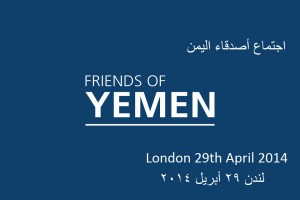The next Friends of Yemen meeting will take place on 29 April in London. The meeting will be opened by the British Foreign Secretary, William Hague, and will be co-chaired by the Yemeni Foreign Minister Dr al Qirbi, the British Minister for the Middle East, Hugh Robertson and the International Development Minister, Alan Duncan, and a delegation from Saudi Arabia. This will be the seventh Friends of Yemen since the group was established in 2010. The Group brings together 39 different countries and international organisations, all of whom have pledged their support to work with the Government of Yemen to build a better future for all its people.
The Friends of Yemen have, since early 2012, been key supporters of the Gulf Co-operation Council’s Initiative and Implementation Plan. The meetings have been an opportunity to encourage the IMF, the World Bank and other international financial bodies to work with the Government of Yemen to start the difficult process of economic reform that is necessary if the Yemeni economy is ever to grow. The Friends of Yemen is not a donor conference, although some countries have previously chosen to announce their pledges at their meetings.
And the Friends of Yemen have consistently spoken of their concern about the deteriorating humanitarian situation in Yemen; the damage that conflict, terrorism and kidnappings are doing to Yemen; and held the Government of Yemen to account on human rights.
I will be attending the Friends of Yemen meeting and, over the next couple of weeks, will be using this blog to discuss the three areas: political transition, the economic and humanitarian situation, and the security situation – which are the focus of the Friends’ activities.
First up this week, it’s the political transition. The role of a friend is to tell the truth and offer help, indeed the Arabic word for friend has at its root in the verb “to tell the truth”. Through the statements that are released after each meeting, the Friends of Yemen makes clear its support for the people of Yemen and the political transition process. A transition led by President Hadi, which the UK believes is Yemen’s best chance in a generation to achieve sustained, meaningful reform.
The month’s meeting will consider the progress that has been made in the political transition since the last Friends of Yemen meeting in New York in September 2013, looking at the significance of the conclusion of the National Dialogue Conference, and the next important steps in the transition process. And I am sure they will encourage both the Supreme Commission for Elections and Referenda and the Constitutional Drafting Committee in their work. The Friends of Yemen are clear that Yemen is still in the early stages of its political transition and that many challenges lie ahead, particularly economic ones. But I am confident that only by having open and frank conversations will Yemen be able to successfully face these challenges.

